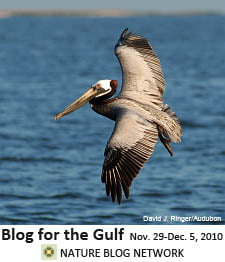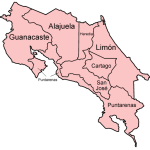 Every American, and indeed many beyond our borders, are acquainted with the grisly details of the 2010 Deepwater Horizon disaster a.k.a. the BP oil spill. Over 185 million gallons of crude oil poured into the Gulf of Mexico, wreaking untold, ongoing damage to a complex ecosystem, not to mention the flora, fauna, and businesses that depend on that ecosystem.
Every American, and indeed many beyond our borders, are acquainted with the grisly details of the 2010 Deepwater Horizon disaster a.k.a. the BP oil spill. Over 185 million gallons of crude oil poured into the Gulf of Mexico, wreaking untold, ongoing damage to a complex ecosystem, not to mention the flora, fauna, and businesses that depend on that ecosystem.
The well may be capped, but the crisis roils on. The U.S. government still hasn’t brought suit or held BP accountable for their responsibility, nor has Congress dedicated Clean Water Act penalties to environmental restoration of the Gulf Coast. If the current lame duck Congress doesn’t pass legislation to this effect, this critical moment may pass without redress or remediation. Every U.S. citizen reading this in December 2010 should urge his or her Senators to act immediately and tell friends (Facebook and otherwise) to do the same.
The opportunity to act on the environmental disaster in the Gulf may be fleeting, but its impact will surely endure. So, with hope, will its true meaning. The real gulf we need to consider is the vast chasm between industry and accountability, between energy security and environmental stewardship. Until we close that gap, we’ll be damned to lurch from seemingly unavoidable crisis after crisis until possbile ecological collapse. Sounds scary, doesn’t it?
I’ve written extensively over the years about the Commons, those physical, informational, electronic, and intellectual assets that we own as a nation or species. The commons are basically all we have. The challenge of every society is to best leverage those resources to increase the present good while protecting the future good. Private industry plays a critical, irreplaceable role in that effort, but must concern itself mostly, if not entirely with the former to the detriment of the latter. In other words, today’s successful corporations seeks maximum short-term profit. Even the far-sighted ones plan in terms of years, which doesn’t sound like a problem until you recognize how far into the future the repercussions of some of their actions extend.
The fact that a corporation’s negative impacts may far outlive its very existence should matter. Laws that govern commercial entities are meant to limit liability, which serves a valuable purpose as very little would get done if every shareholder and employee was liable for the crimes of the company. But when a corporation utterly despoils an ecosystem and then evades responsibility through legal wrangling, bankruptcy proceedings, or even dissolution, then we the people are left holding the proverbial bag. And regardless of who bears the financial responsibility, the ecosystem itself is destroyed.
- The gulf we should be concerned about is the one that permits a coal company to blow the tops off mountains and choke the valleys below with toxic fill.
- The gulf we should be concerned about is the one that trades clean public drinking water for private natural gas (at least New York state has deferred that decision for a while!)
- The gulf we should be concerned about is the one that allows a company to conduct activities with the potential to destabilize entire ecosystems without a proactive PLAN in place to mitigate damage before it becomes catastrophic.
The gulf I’m describing is the absence of accountability, the lack of a plan. Take wind turbines, for example. I’m a huge fan of wind turbines; after all, who doesn’t love the dream of clean, renewable, domestic energy? But while every properly operational turbine takes us a step further along the good road of energy security, not every turbine is good.
My friends and yours, Kim and Kenn Kaufman have been working frantically and writing eloquently to promote a three-year moratorium on building wind turbines in the most critical areas of stopover habitat in northwest Ohio. Why so serious about some midsize turbines, not even a big commercial wind farm? Birders understand the big deal; the northwestern Ohio coast of Lake Erie is a migratory magnet, one of the birdiest places you’ll ever to be lucky enough to visit at the right times of year. That’s why we who care for our commons (which conveniently include jewel-colored wood warblers) need to always demand a plan from anyone who would use our commons.
Siting wind turbines smack dab in the middle of one of the most active, densely traveled flyways in all of North America right at the place where birds are known to be at their most vulnerable may lead to some unexpected consequences. Yet, some advocates of the turbines wave off concerns, stating that nothing bad will happen. What if something bad does happen? What if a poorly placed turbine shreds a significant portion of the population of a fragile avian species, consequently weakening the genetic viability of the population or triggering a total collapse?
Unintentional decimation of a species sounds like a doomsday scenario, but the point is the need for a plan to avoid such irrevocable damage. No known agency can bring a species back from the other side of extinction. Certainly, no company can. At a certain point in American history, good money was made selling Passenger Pigeons by the barrel. Nonetheless, when the thunderous flocks were thinned past the point of sustainability, nobody brought the pigeons back. Nobody is popping the tops back on mountains either.
History is replete with such failures, stories about how private industry time and time again ruined what was ours to get theirs. When your cherished species are gone with naught but a Superfund site in recompense, don’t blame business. Companies are not built to be concerned about the commons. The responsibility to protect what is yours lies with you. So where can you start?
First, urge your Senators to designate Clean Water Act penalties paid for by BP towards Gulf recovery and restoration
Next, urge Ohio representatives to support a three-year moratorium on the building of any additional wind turbines within the area of greatest concern: specifically, within three miles of the Lake Erie shoreline in Lucas, Ottawa, Sandusky, and Erie Counties.
Then, think about how to narrow that monstrous gulf between action and accountability that allows even well-meaning agents and organizations to ruin what is yours, sometimes forever. Support regulations that require a plan from anyone who proposes to mess around in your commons. With hope and effective planning, we can break the cycle and turn back the tide of mass extinctions and global warming. Without these things, we’re screwed!














Fabulous, Mike. Thanks for spreading the word!
Excellent article! I hope it reaches a larger audience.
Mike, This is a wonderfully clear and cogent discussion of a very complex issue … you have a genius for tying things together in a logical way and showing the important connections. Thank you for including our n.w. Ohio efforts in your essay. Your support means a lot to us.
Thank you, Mike, for a well-written and poignant essay. It really made me pause and think.
Mike, I… I’m at a loss. I don’t even know what to say. Kenn and Janet say it perfectly: you are, indeed, a genius at communication, and the essay is beautifully written. Thank you for validating our concerns for n.w. Ohio with this outstanding piece of writing.
Mike, amazing essay. I enjoy reading your posts, but this one stands out the most to me. After reading this, I am going to make sure I write to my senators about the oil spill and wind development near Lake Erie. Thank you for spreading the word about these two topics that could or would hurt bird populations. Thanks again!
Thanks all. I’m grateful for your compliments, as I worried that the (relative) brevity of the post would make it tough to get the point across.